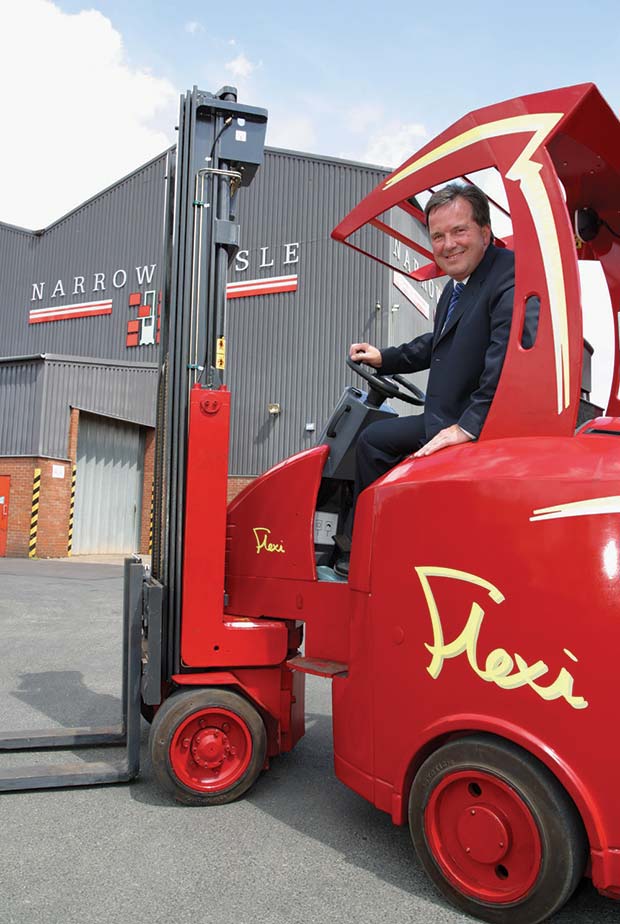When it comes to forklift truck design, innovation for innovation’s sake cannot be justified, says John Maguire, Flexi Narrow Aisle’s Sales and Marketing Director
 Flexi Narrow Aisle has been designing and producing specialist space saving warehouse trucks since 1976 and has been building Flexi articulated forklift trucks at its site in Tipton since the early 1990. The company has built and sold many thousands of trucks throughout the world and the pace of growth in markets outside Europe has been accelerated in the last two years.
Flexi Narrow Aisle has been designing and producing specialist space saving warehouse trucks since 1976 and has been building Flexi articulated forklift trucks at its site in Tipton since the early 1990. The company has built and sold many thousands of trucks throughout the world and the pace of growth in markets outside Europe has been accelerated in the last two years.
The success of the Flexi front wheel drive (FWD) articulated forklift concept has been based around the fact that the truck’s clever design allows it to load and unload trailers like a counterbalance forklift truck and still work comfortably within very narrow aisles saving up to 50 per cent of space required without compromising productivity compared to a conventional counterbalanced forklift truck.
And 2013 is shaping up to be a record year for global sales of Flexi articulated forklift trucks with production at our recently expanded UK factory up 40 per cent.
Sustained export success – with demand from the German manufacturing sector particularly strong – and sales to the rapidly developing e-fulfillment market are two reasons for the growth.
But, the stability of our product offering is, I am sure, also playing a significant role in the Flexi’s success.
At Flexi we focus all our energies on making our established articulated forklift ranges more productive and more customer friendly. The Flexi articulated truck concept is now established technology – comparable, for example, with the technology behind a counterbalanced or reach truck.
By focusing on established and successful design principles and quality we have been able to develop products that offer ever higher throughput efficiencies and safety and the lowest running costs.
While this mature and measured attitude to product design and quality is paying off for Flexi – as our spiraling sales figures testify – some materials handling equipment manufacturers appear to be taking a different approach.
In my view, some MHE manufacturing companies place too much emphasis on trying to appear innovative – often to the detriment of their established products and, to some extent, to their credibility.
Innovation for innovation’s sake does not bring any value whatsoever. As we have realised down the years, innovation needs to be directed to be of any worth and if you do not have clear objectives you can spend lots of time developing something that brings no benefit to anyone.
Arguably there is a certain amount of publicity mileage to be made by coming to the market with innovative-looking products, but there seems little point in going into production with something that few people – if anybody – will buy.
The founder and present day Managing Director of Flexi Narrow Aisle, Peter Wooldridge, has been designing ground-breaking warehousing trucks – and building them in the UK – since the mid 1970s. His company’s first creation, the Rota-Reach, seemed so unusual it earned him an appearance with Raymond Baxter on Tomorrow’s World.
He went on to become a pioneer and leader in the development of Very Narrow Aisle technology – popularising the concepts of guided lateral stacking and man-up order picking trucks.
Then, in 1990, he repeated the feat – and played a huge role in bringing the ground breaking idea of articulated trucks squarely into the mainstream.
Back in the 1990s, the Flexi concept was perceived by many commentators to be a quirky, niche product, but the Flexi articulated truck is now established as mainstream materials handling equipment, not just in the UK but throughout the world.
We believe that the market for articulated forklifts will continue its upward trajectory –but confidence in the articulated forklift truck concept risks being undermined if variations on the articulated theme fail to provide cost effective buyback for companies that invest in them.
Flexi Narrow Aisle





Comments are closed.